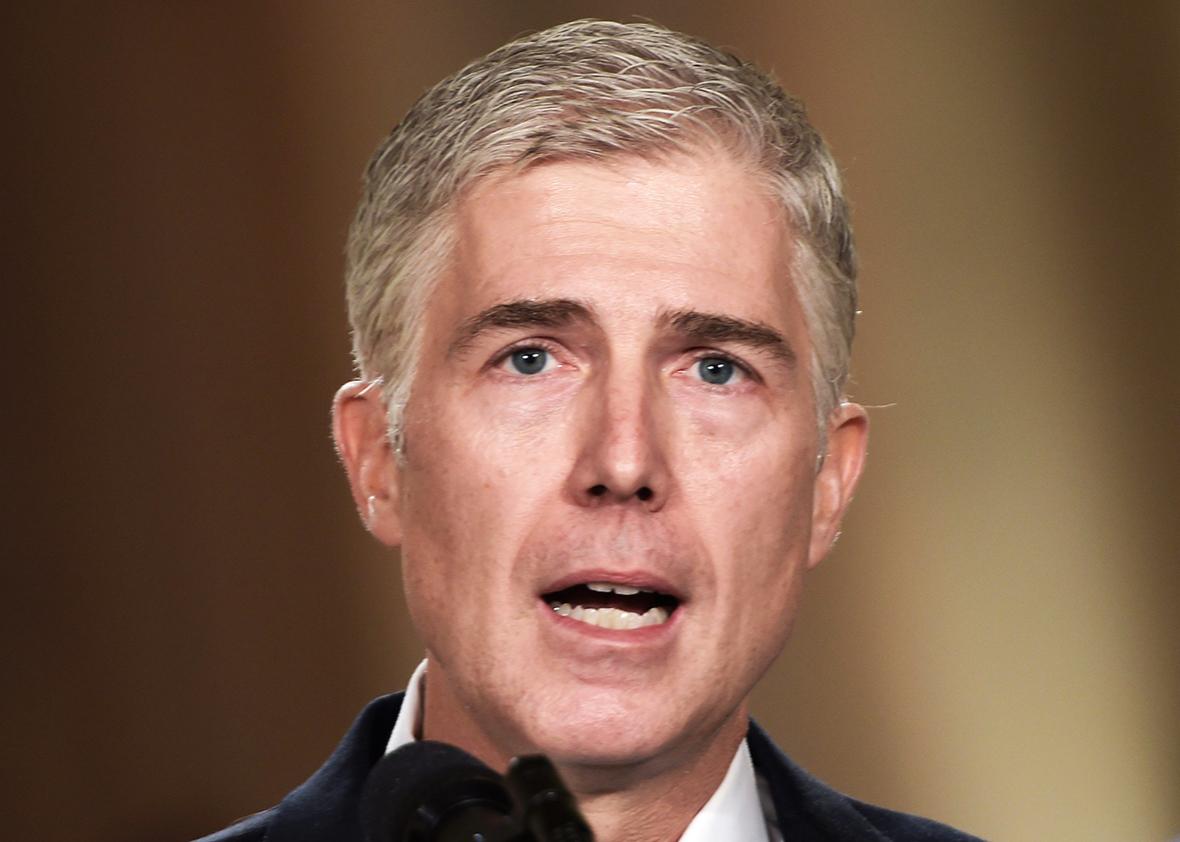On Tuesday night, Donald Trump nominated Neil Gorsuch to fill the vacant seat on the U.S. Supreme Court. Right now, Senate Democrats can defeat Trump’s nominee only if they stay united in their opposition to Gorsuch and three of the 52 Republican senators agree to vote against him. Democrats also have the authority under the current rules of the Senate to filibuster the nominee. But actually following through on that threat would likely cause the Republicans to do away with the filibuster forever—the so-called “nuclear option”—and to confirm the nominee by a simple majority vote. Although reasonable Democratic minds can and will differ about whether Senate Dems should do everything in their power to shut down the confirmation process, they may be unable to prevail no matter what scenario comes to pass.
Given the difficultly of the terrain for Democrats, what could a victory look like for them? Three markers of possible success come to mind.
First, victory would require making an effective case to the American people that any nominee not named Merrick Garland is per se politically illegitimate. By all rights this is the Democrats’ turn to appoint a justice. Senate Republicans—following candidate Trump’s instruction to “delay, delay, delay”—stole this nomination from President Obama even though he had nearly a year to go in his term and even though he nominated a judge who was plausibly confirmable by a Republican Senate. Republican calls for a postelection reboot should not obscure the fact that last October, Ted Cruz, John McCain, and Richard Burr were pledging to hold the vacant seat open for four years in the event of a Hillary Clinton win. That was their commitment.
The nation has not seen anything like the behavior we witnessed from Senate Republicans since at least Reconstruction in the late 1860s. Then, Senate Republicans went to war on both Democratic President Andrew Johnson (whom they impeached) and the Supreme Court (whose size they decreased and whose jurisdiction they stripped). Now, going into these hearings as though Garland and Obama were not grievously insulted would be a serious mistake.
At the very least, Democrats should insist that Garland, not the late Justice Antonin Scalia, provides the baseline against which to measure the nominee’s ideological reasonableness. Scalia had formidable strengths as a jurist and as a person, but he was also one of the most ideologically conservative justices in the history of the court, and he became increasingly willful and even seemingly partisan toward the end of his career. It is concerning that Judge Gorsuch appears to have perfected the Scalian trope that conservatives do real “law” in constitutional cases while liberals do naked “politics” masquerading as law. The irony is that only someone who thinks politically could believe such a thing. In a widely read 2005 essay in National Review, Gorsuch criticized liberals for relying on courts to push political causes ranging from “gay marriage to assisted suicide to the use of vouchers for private-school education.” One wonders whether using courts to try to dismantle the Affordable Care Act, to invalidate the heart of the Voting Rights Act, or to permit corporations and superwealthy individuals to make unlimited expenditures to influence elections has no relation to a political agenda. Does he really believe that only the conservative causes are “in” the Constitution?
Second, given Trump’s explicit promises and pre-election pledges of constitutional litmus tests, a Democratic victory would require the nominee to rebut the ongoing presumption that he possesses the exact same legal views promised by the president who appointed him. For example, is the nominee committed to voting to overturn Roe v. Wade, which is what Trump expressly promised his nominee would do? Will he expand the reach of Heller to protect even more gun possession in more places and to dismantle reasonable gun regulations that states and cities have enacted to protect the public? This was Trump’s pledge. Is it permissible for the government to use religion as an explicit or implicit basis for excluding people from coming to this country?
Democrats cannot be satisfied when the nominee predictably tries to avoid answering these questions by invoking the tired excuse that the issue may come before the court. Trump was (barely and technically) elected in part by promising that his nominees would be vetted for their compliance with the ideological requirements of the conservative Heritage Foundation and Federalist Society, and the public must learn why the president is confident that this nominee meets all of their requirements.
Finally, victory in these hearings looks like talking directly to all of the Americans—and especially the young people—who have come out to rallies at airports and who participated in or supported the recent women’s marches and protests around the country. Senate Democrats should explain to them earnestly and clearly that if they want to avoid future similar nominations by future similar presidents, they must vote around the issue of the Supreme Court with the same passion with which they have rallied for justice. Senate Democrats must help them understand that control of the court is as urgent a priority for Democratic voters as it is for Republican ones. Progressive commitments to reproductive rights, environmental protections, workers’ rights, racial equality, and so much more are either vindicated or vitiated at the Supreme Court. Senate Democrats might also suggest that the reason Judge Garland never had a hearing is that not enough Democratic voters in a few swing states retaliated by using the only legal leverage available to them—the power to punish obstructive Senate Republicans at the ballot box. This point alone should be a lodestar of the hearings: Elections matter for the court, even if most of what the court does is obfuscated and footnoted.
Regardless of whether Democrats win the fight on Judge Neil Gorsuch, they can win the war on constitutional norms, the rule of law, and an independent judiciary. They can also win the future.
